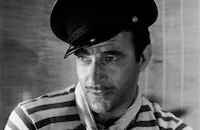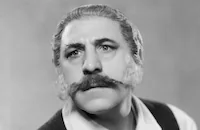The Passionate Plumber

Brief Synopsis
Cast & Crew
Edward Sedgwick
Buster Keaton
Jimmy Durante
Polly Moran
Irene Purcell
Gilbert Roland
Film Details
Technical Specs

Synopsis
Elmer E. Tuttle, a Parisian plumber, is summoned by socialite Patricia Jardine's chauffeur, Julius J. McCracken, to fix her shower. Patricia is in love with Tony Lagorce, whom she met in Monte Carlo, but is trying to avoid him because Tony has told her he is married to Nina Estrados, who will not give him a divorce. Tony is not really married, however, and tells Nina that he can't marry her because he is married to Patricia and she will not give him a divorce. When Tony, who has just arrived in Paris, breaks into Patricia's room, he sees Elmer come out of the shower and assumes that he is her lover. He then challenges Elmer to a duel, which neither wins. At a fancy dress party, Elmer, helped by Julius, tries to show famous French general Bouschay the new pistol he has invented, but when he does, the general thinks that Elmer is an assasin and runs away. Because Elmer has fallen in love with Patricia, he is desperate to sell his invention so he can court her, and crashes the party once more. When Tony sees Elmer, he again thinks that Elmer is Patricia's lover, and she encourages his misconception when she takes Elmer to the baccarat table. There Elmer again encounters the general, who is as frightened of the gun as he was the first time, and pandemonium erupts. Later that night, Julius drags Elmer back to Patricia's house and she asks him to act as her lover to keep her away from Tony. Because she fears that her resolve may weaken, she tells Elmer to use force, if necessary, to keep her and Tony apart. When Tony arrives and asks Patricia to go away with him, she succombs to his charms, but then Elmer enters the bedroom and starts to kiss her, inciting a jealous Tony to leave. Elmer stays outside Patricia's bedroom door until morning, angering Patricia, who asks her maid Albine to think of a way to get rid of him. but nothing works. During one of her attempts to oust Elmer from the house, Patricia's Aunt Charlotte comes for a visit and suspects that Patricia is entertaining a man in her room. To save Patricia's reputation, Elmer then pretends that he is a doctor. When he briefly leaves the room, Patricia sneaks away in her aunt's clothes and goes to Tony, after which Elmer calls him and tells him to come to Patricia's house. Soon a furious Nina arrives at Patricia's house, followed by Patricia, who has just returned from Tony's . When the two women start to exchange information, they suddenly realize that Tony has been deceiving them both. When Tony arrives, they hide and listen as Tony explains his technique with women to Elmer. Infuriated, the women then appear and start throwing most of Patricia's furnishings at the incredulous Tony. After the melee, Tony leaves, followed by Nina, who decides that he really is the man for her. Then Patricia goes to Elmer, suddenly realizing that she loves him, and Julius goes to Albine, who is his perfect woman.

Director

Edward Sedgwick
Cast

Buster Keaton

Jimmy Durante

Polly Moran
Irene Purcell

Gilbert Roland

Mona Maris

Maude Eburne

Henry Armetta
Paul Porcasi
Jean Del Val
August Tollaire

Edward Brophy
Rolfe Sedan
Crew

Film Details
Technical Specs

Articles
The Passionate Plumber
"If they had known I was still essentially a slapstick comedian they would not have bought for me the sort of stories they did. These purchases included two Broadway farces: Parlor, Bedroom, and Bath [1931] and Her Cardboard Lover- MGM renamed it The Passionate Plumber [1932] - which was nothing compared to the names the critics called our movie version."
Certainly this is not up to the standards of such Keaton masterworks as Sherlock, Jr. (1924), The General (1927), or Steamboat Bill, Jr. (1928). Nevertheless, it did respectable business and many consider it a pleasant if minor footnote to what had been up to that time a remarkable career. Buster plays an American plumber living and working in Paris used as a decoy lover by a wealthy girl who wants to make her real lover jealous. Compared to the other sound films Keaton made at the studio during this time, it has a lot of peppy charm and some very funny scenes, including a few in which Keaton gets to show the physical prowess that made him such a formidable screen presence in the 1920s.
Keaton was cast in the role originally played on stage by Leslie Howard, the suave British star best known for his role as Ashley Wilkes in Gone with the Wind (1939). The story underwent considerable reworking to suit Keaton's persona, especially after the urging of MGM's Paris exchange manager, who found the star's previous release, Sidewalks of New York (1931), "very weak" and cabled studio head Louis B. Mayer to "make particular effort have Passionate Plumber dialogue most humorous possible." In addition to paying $33,000 for the rights to the story, records indicate the studio also spent about $15,000 to buy an additional "three scenes for Keaton."
Part of the picture's appeal lies in its supporting cast, including rowdy former vaudevillian and Mack Sennett silent star Polly Moran and sexy Latin lover Gilbert Roland, under the direction of Edward Sedgwick, who had collaborated so well with Keaton on a few of his best silent pictures, notably The Cameraman (1928). This was also the first movie in which Buster was teamed with Jimmy Durante, a situation Keaton was not happy with. Besides sensing there was no way to ever mesh their two very different talents and approaches, Keaton was certain their pictures together were being used to build up Durante's career at the expense of his own. Keaton also found his co-star personally irritating, particularly Durante's habit of good-naturedly but roughly punctuating all his conversations by punching Keaton in the arms and chest.
In those days, many pictures were shot in several languages for foreign markets, and Keaton was particularly adept at reproducing his dialogue phonetically for the non-English versions. The Passionate Plumber was also released as a French movie, co-directed (with Sedgwick) by Claude Autant-Lara, who went on to a long career in his country's cinema but achieved his biggest notoriety when in 1989 he was forced to stand down as the representative of France's far-right National Front in the European Parliament after saying reports of the Nazi gas chambers were a "string of lies."
Shot in only 19 days, this was the last of Keaton's MGM pictures to be completed on time. As his personal life continued to take negative turns and he became more and more bitter and resentful of his career misfortunes, he became increasingly difficult and undependable. A decade later, the property on which the movie was based turned out to have less-than positive associations for another great Metro star. Remade under its original title, Her Cardboard Lover (1942), the picture did poor business and got tepid reviews, prompting its star, Norma Shearer, once the queen of the MGM lot, to retire for good at the age of 40 after more than 20 years in motion pictures.
Director: Edward Sedgwick
Screenplay: Laurence E. Johnson, Ralph Spence, based on the plays Her Cardboard Lover by Frederick Lonsdale and Dans sa candeur naive by Jacques Deval
Cinematography: Norbert Brodine
Editing: William S. Gray
Art Direction: Cedric Gibbons
Cast: Buster Keaton (Elmer E. Tuttle), Jimmy Durante (Julius J. McCracken), Irene Purcell (Patricia Alden), Polly Moran (Albine), Gilbert Roland (Tony Lagorce).
BW-73m.
by Rob Nixon

The Passionate Plumber
Quotes
Trivia
Notes
The play Her Cardboard Lover was adapted from the French play Dans sa candeur naïve by Jacques Deval (Paris, 13 January 1926). The Broadway version of the play starred Jeanne Eagels and Leslie Howard. The working title of the film was also Her Cardboard Lover. According to a news item in Film Daily, Nils Asther was originally scheduled to appear in the film, probably in the role taken over by Gilbert Roland. Various news items in Hollywood Reporter prior to the film's production noted that Robert Montgomery was originally cast in the lead in early August 1931 and that M-G-M had announced that it would shelve the picture in early September 1931. On 14 Sep, however, the project was re-activated when Buster Keaton was announced as the lead. Following Keaton's assignment, Leo McCarey was announced as the director, but was replaced by Edward Sedgwick. One news item noted that Byron Morgan was to adapt the play, however, his participation in the completed film cannot be confirmed. Charlotte Greenwood was announced for a role in the picture, but she did not appear in the film. Her role was probably to have been that of Aunt Charlotte, the part played by Maude Eburne. This was the first picture in which Jimmy Durante co-starred with Buster Keaton as a comedy team. A French-language version, Le plombier amoureux, was also produced. M-G-M made another film adaptation of the play in 1942 under the title Her Cardboard Lover. That film was directed by George Cukor and starred Norma Shearer and Robert Taylor.














